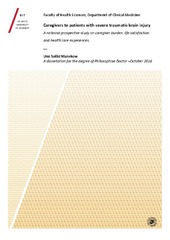| dc.contributor.advisor | Anke, Audny | |
| dc.contributor.author | Manskow, Unn Sollid | |
| dc.date.accessioned | 2017-08-28T13:45:03Z | |
| dc.date.available | 2017-08-28T13:45:03Z | |
| dc.date.issued | 2017-02-24 | |
| dc.description.abstract | Background: Severe traumatic brain injury (TBI) is a major public health challenge as it often has huge consequences for the patient and the family for a long time after the injury.
Objective: Assess caregiver burden and predictors of burden 1year post injury, investigate change and stability of caregiver burden and life satisfaction over time. Develop a validated tool to assess family member’s in-hospital health care experiences.
Methods: A Norwegian prospective cohort multicenter study including 122 caregivers to patients with severe TBI. A structured questionnaire were used to assess caregiver burden, change in burden and life satisfaction over time and predictors of burden 1 and 2 years post injury. The Family Experiences of in-hospital Care Questionnaire for family members of patients with severe Traumatic Brain Injury (FECQ-TBI) were developed.
Results: Paper I and II reported a moderate to high caregiver burden up to 2 years post injury. A poor social network, feeling lonely and taking care of a patient with more functional problems were significant predictors of a high burden. A significantly higher caregiver burden and lower life satisfaction at 2 years compared to 1 year post-injury were found. Paper III describes the development of the FECQ-TBI. Principal component analysis extracted six subscales: acute organization and information, rehabilitation organization, rehabilitation information, discharge, hospital facilities-patient and hospital facilities-family. All subscales had Cronbach´s alpha coefficients > 0.80, confirming the internal consistency. Hypothesis testing supported construct validity.
Conclusion: Caregivers of patients with severe TBI experiences a considerable caregiver burden long time post injury.The FECQ-TBI showed good psychometric properties and construct validity, supporting the use of the FEQC-TBI to assess quality of in-hospital care from a family perspective. The results may have clinical implications as improved family-centered acute and rehabilitative care and a long-term follow-up can prevent the perceived caregiver burden over time. | en_US |
| dc.description.doctoraltype | dr.philos. | en_US |
| dc.description.popularabstract | Fra vondt til verre - hodeskader rammer hele familien
Alvorlige hodeskader er belastende for familien over tid. Det viser den første norske studien om pårørende til pasienter med alvorlig traumatisk hjerneskade i Norge.
.
Studien ble utført i samarbeid med universitetssykehusene i Oslo, Bergen, Trondheim og Tromsø. Vi kartla pårørendes omsorgsbelastning og livstilfredshet ved bruk av et spørreskjema 1 og 2 år etter skaden. Totalt 122 pårørende deltok.
Halvparten av pårørende oppga en moderat til høy omsorgsbelastning etter 1 år. Ensomhet og isolasjon var de to viktigste risikofaktorene for høy belastning, samt å være pårørende til en pasient med et lavt funksjonsnivå. Fra 1 til 2 år økte pårørendes omsorgsbelastning og livstilfredsheten ble redusert. Et spørreskjema for å undersøke pårørendes erfaringer med helsetjenesten ble utviklet for å få informasjon om kvaliteten i den akutte behandlingen og rehabiliteringen etter skaden.
Pasienter med en slik skade har ofte usynlige vansker som påvirker personlighet og atferd, familieliv, jobb og sosiale relasjoner i lang tid. Pårørende er en viktig ressurs og en del av pasientens behandling og rehabilitering. De får hovedansvaret etter at pasienten kommer hjem og blir en forlengelse av helsevesenet. Det er svært viktig å finne ut hva som forårsaker belastning hos de pårørende. Dette kan gi helsepersonell ny kunnskap om tiltak for å forebygge dette i fremtiden og å forbedre den helhetlige omsorgen til familien i alle faser av behandling og rehabiliteringen. Studien viser at en langvarig oppfølging av familien etter alvorlig hodeskade vil være viktig.
Unn Sollid Manskow
Tlf: 45423793
unn.manskow@gmail.com | en_US |
| dc.description | The papers of this thesis are not available in Munin. <br> <br>
Paper I: Manskow, U. S., Sigurdardottir, S., Røe, C., Andelic, N., Skandsen, T., Damsgård, E., Elmståhl, S., Anke, A.: «Factors Affecting Caregiver Burden 1 Year After Severe Traumatic Brain Injury: A Prospective Nationwide Multicenter Study”. Available in <a href=http://dx.doi.org/10.1097/HTR.0000000000000085> J Head Trauma Rehabil. 2015, 30(6):411-423. </a>
<br> <br>
Paper II: Manskow, U. S., Friborg, O., Røe, C., Braine, M., Damsgård, E., Anke, A.: “Patterns of change and stability in caregiver burden and life satisfaction from 1 to 2 years after severe traumatic brain injury: A Norwegian longitudinal study”. (Manuscript). Published version available in <a href=http://dx.doi.org/10.3233/NRE-161406> NeuroRehabilitation 2017, 40(2):211-222. </a>
<br> <br>
Paper III: Anke, A., Manskow, U. S., Friborg, O., Røe, C., Arntzen, C.: «The family experiences of in-hospital care questionnaire in severe traumatic brain injury (FECQ-TBI): scale structure and validity”. (Manuscript). Published version available in <a href=http://doi.org/10.1186/s12913-016-1884-6> BMC Health Services Research 2016, 16:675. </a> | en_US |
| dc.identifier.uri | https://hdl.handle.net/10037/11388 | |
| dc.language.iso | eng | en_US |
| dc.publisher | UiT The Arctic University of Norway | en_US |
| dc.publisher | UiT Norges arktiske universitet | en_US |
| dc.rights.accessRights | openAccess | en_US |
| dc.rights.holder | Copyright 2017 The Author(s) | |
| dc.rights.uri | https://creativecommons.org/licenses/by-nc-sa/3.0 | en_US |
| dc.rights | Attribution-NonCommercial-ShareAlike 3.0 Unported (CC BY-NC-SA 3.0) | en_US |
| dc.subject | traumaticbrain injury | en_US |
| dc.subject | caregivers | en_US |
| dc.subject | VDP::Medisinske Fag: 700::Helsefag: 800::Samfunnsmedisin, sosialmedisin: 801 | en_US |
| dc.subject | VDP::Medical disciplines: 700::Health sciences: 800::Community medicine, Social medicine: 801 | en_US |
| dc.subject | VDP::Medisinske Fag: 700::Klinisk medisinske fag: 750::Traumatologi: 783 | en_US |
| dc.subject | VDP::Medical disciplines: 700::Clinical medical disciplines: 750::Traumatology: 783 | en_US |
| dc.title | Caregivers to patients with severe traumatic brain injury. A national prospective study on caregiver burden, life satisfaction and health care experiences. | en_US |
| dc.type | Doctoral thesis | en_US |
| dc.type | Doktorgradsavhandling | en_US |


 English
English norsk
norsk
